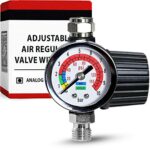Anti Vibration Pads on tanks used for the gas powered compressors. Anti Corrosive / Rust prevention blended steel increase tank life.
air compressor tank top plate Related Question:
How thick is the metal on an air compressor tank?
Thickness and Type of Metal of the Air Compressor Tank Walls The average pressure that an air compressor tank with powder-coated steel can handle is 200 PSI with 1/8 inch walls. These specifications are similar to painted steel.
Is it OK to leave compressor tank pressurized?
With so much air under so much pressure, can you leave an air compressor full? The short answer is yes, it is perfectly safe to leave an air compressor full. However, this assumes that it has been properly maintained, with regular draining to remove accumulated moisture from inside the tank.
Where should I mount my air compressor?
The preferred location for mounting air compressors is on the inside of the frame rail under the vehicle. There is plenty of air flow to keep the compressor cool and the compressor itself is sufficiently protected from the elements. A little water splashed on the compressor won’t hurt it.
Can a compressor tank explode?
Yes, air compressors can blow up. Air compressor explosions are most commonly caused by substantial corrosion of the compressor tank. Excessive condensation leads to corrosion, and you can avoid this outcome by monitoring and servicing the compressor and its auxiliary components.
How do you keep a compressor tank from rusting?
The most effective way to prevent rust in your air tanks is to drain each tank regularly after every operation. This process helps eliminate the condensation that’s pooled at the bottom of the tank. After draining, leaving the valve open for a couple of hours will allow the inside of the tank to dry out.
Can you MIG weld with compressed air?
When air gets into the arc while you’re welding, it causes air bubbles to form within the molten metal, creating a weak and very ugly weld. You cannot MIG or TIG weld without a shielding gas unless the filler material being used is flux-cored or flux coated.
How thick are compressed air tanks?
A compressed air tank having an inner radius of 2ft. and a wall thickness of 0.25 in. is manufactured by welding two steel hemispheres as shown in the figure.
What are air compressor tanks made of?
In most cases, air compressor tanks are made from steel, with an exterior coating to prevent corrosion.
Can I just unplug an air compressor?
Disconnect air compressor from power source and bleed off all air pressure before attempting any maintenance or repair. SHUTDOWN AND STORAGE: NEVER stop the air compressor by unplugging it from the power outlet as this may result in damage to the compressor.
How long can I leave air in my compressor?
Depending on the size and type of compressor, air compressors can be left running anywhere from a few hours to 24 hours a day, seven days a week.
How often should you drain water from air compressor?
It is recommended that you drain your tank daily, whether it is manually or automatically. Water build up in your tank can cause the bottom of your tank to rust forcing you to invest in a new tank. If you find yourself forget about draining your tank, you should look into purchasing an electronic drain valve.
Can a rusted air compressor tank explode?
Rust. If the tank is not drained daily, liquid can accumulate in the bottom of the tank over time. This liquid can corrode the bottom interior of the tank, eventually leading to the air pressure inside rupturing the weakened metal and causing an explosion.
Can you replace the tank on an air compressor?
Now you may be able to find a replacement tank from the same vendor who sold you your air compressor but the new tank’s cost may be quite high. In fact, in some cases, the replacement tank may cost you as much as the whole air compressor unit when you originally bought it.
Why do compressed air tanks explode?
The leading cause of air compressor tank explosions is corrosion. When operators don’t drain the water that accumulates in their tank, the water can cause corrosion, weakening the tank until the compressed air breaks it open.
Why is argon used in welding?
During the welding, process metals are exposed to temperatures of upwards of 7000 Degrees. At these temperatures, most metals become liquid, which allows the formation of the weld. Argon is used to protect the molten pool of metal against elements in the Atmosphere including Oxygen, Nitrogen, and Hydrogen.

